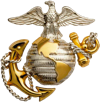
Service Branches
Work Environment
Because the infantry must be prepared to go anywhere in the world they are needed, they work and train in all climates and weather conditions. During training exercises, as in real combat, troops work, eat, and sleep outdoors. Most of the time, however, they work on military bases.
-
Military Status
Enlisted
-
Median Military Salary This is the median, or the midpoint, of the salary range for this career.
$59,706
Military Salary Range Salary varies based on years of service, degree level, special pays, family status and location.
$23,466 - $246,948
Overview
Members of the infantry are ground troops that engage with the enemy in close-range combat. They operate weapons and equipment to engage and destroy enemy ground forces. This job is typically considered to be the job in the Military that is more physically demanding and psychologically stressful than any other job.
Military Training
All enlisted service members complete basic military training, which includes time spent in a classroom and in the field, and covers tactical and survival skills, physical training, military life and customs, and weapons training. While some of the training is in the classroom, most infantry training is in the field under simulated combat conditions. In reality, training for an infantry service member never stops. Infantry service members keep their skills sharp through frequent squad maneuvers, target practice, and war games. War games conducted without live ammunition allow soldiers to practice scouting, troop movement, surprise attack, and capturing techniques.
Helpful Attributes
- Ability to stay in top physical condition
- Interest in working as a member of a team
- Readiness to accept a challenge and face danger
Related Civilian Careers
- Supervisors of Police and Detectives
- Security Guards
Roles in the Corps: Infantry
Infantry is the central component of Marine ground forces. Infantry Marines are trained to locate, close with and destroy the enemy by fire and maneuver, or repel the enemy's assault by fire and close combat. Riflemen serve as the primary scouts, assault troops and close combat forces within each infantry unit.
Length 2:35 View TranscriptTranscription
I am Sergeant Dues.
I am an 0311 Infantry Rifleman.
And I'm one of 2nd Platoon Squad Leaders.
Short story, when the guy's out there with the rifles, you know, boots on the deck, we're
the ones going out there and doing the patrolling day in day out.
A lot of stuff we're capable of doing.
Anything from being on foot.
Basic security patrols, we can do recon patrols, we can go out there, hunt down the enemy or,
and then you can throw us in the vehicles.
We can patrol in vehicles, do some of the same things with trucks that we can do on
foot.
We have to know down to the smallest level, a large spectrum of things.
I think what separates us the most is basically our level of training, our level of dedication.
My Marines, the Marines that I train, I want to teach them the basics, the fundamentals,
the things that are going to be there to save us in case, say, that GPS goes out, the radio
goes down.
In the infantry, we have to depend on one another.
We form a brotherhood throughout training.
I have to rely on my team leaders and make the right decisions when I'm not there.
Preparing not only myself and my Marines, it's a long task.
It's something that can never be said, hey, you're done.
You're finished preparing for this.
To me and to my Marines, I think that training is something that you'll always continue and
you can always learn something every day.
The Marine Corps has got a warfighting doctrine that talks about the preparation for war,
that everything we do now is going to translate into what we do when we actually operate.
That holds so true.
We're capable of being sent anywhere on a short notice.
We have to be ready for, not only the kinetic fights, the wars that are going on now in
Iraq and Afghanistan, but we have to be ready for any other types of stuff.
Maybe it's humanitarian operations.
So we have to be, not only ready to do the jobs that we came in the Marine Corps with,
but we have to be able to learn.
We have to be prepared for anything else that can come down the pipe at us.
My last deployment in Iraq, there was about 18 Marines and we were partnered with an Iraqi
Army division of about 700 or 800 soldiers.
Now, we were partnered with them, slept with them, ate with them, patrolled with them,
and that was definitely a great experience.
When we were actually operating, that's why we do so well, because we're out there fighting
for the brother on your left and the brother on your right.
I love being a US Marine.
I love being able to say that I'm infantry, I'm the one with boots on the deck.
It's one of those pride things.
I'm proud to do it.
I truly am.
Roles in the Corps: Infantry
More careers in this field
See all












